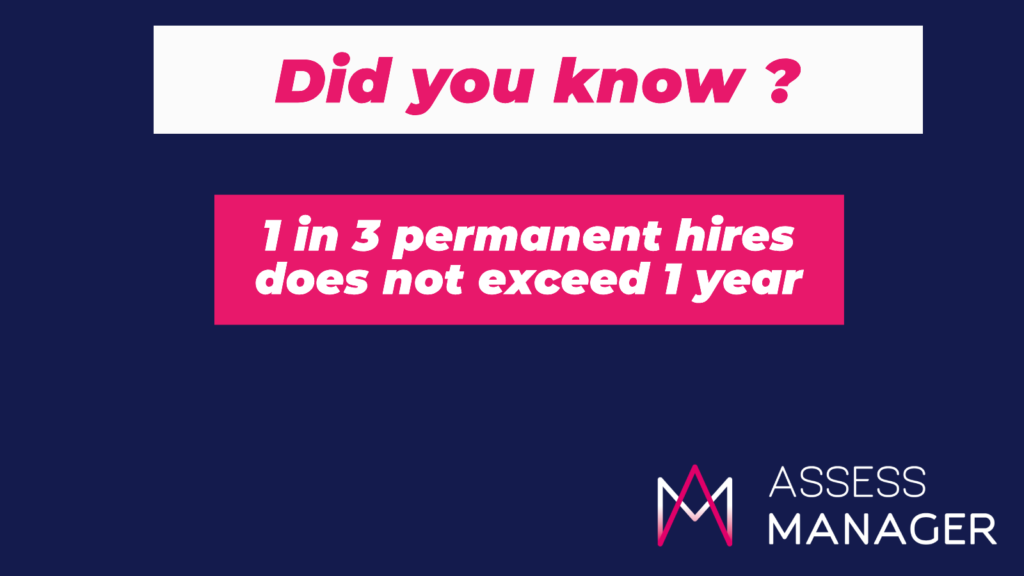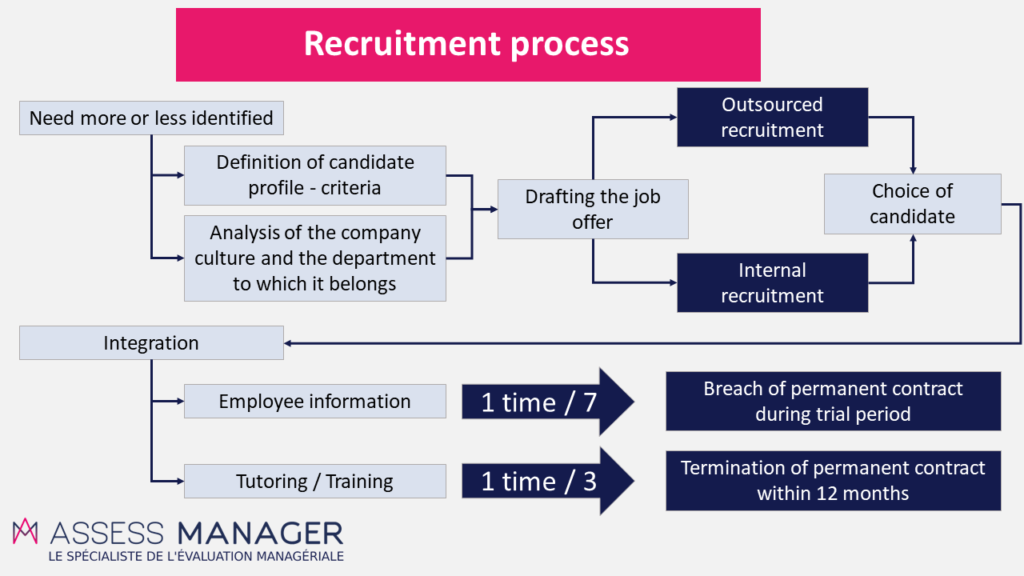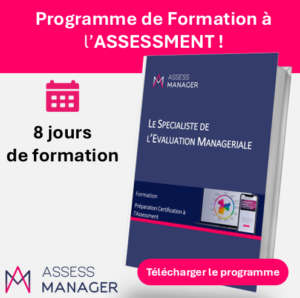Key figures on unsuccessful recruitment, analysis and solutions
In this article, we present :
– The recruitment process as a whole
– Key figures on recruitment error rates
– Reference figures in terms of costs
– Analysis of the causes of error and associated solutions
The recruitment process as a whole
In 2014, Acoss (the national fund for the Urssaf network) identified 2.9 million permanent contracts signed. The overall recruitment process can be broken down as follows:

From the emergence of the need to the confirmed integration of the candidate, the process is more or less long and fluid depending on the company.

Although the recruitment process is sometimes disconnected from the integration phase, companies are increasingly seeing the need for follow-up and are paying particular attention to the trial period.
Progress reviews carried out with newly recruited employees help to confirm that they are settling in well, and to make any necessary adjustments. Sometimes this leads to a breach of the employment contract, at the initiative of the employee or the company itself: one time out of 7, according to DARES studies.
Some key figures on the recognised recruitment error rate
The rate of permanent contracts that do not reach the end of the trial period was 13% in 2012 (source: DARES, Ministry of Labour).
In 2014, 377,000 jobs in France did not go beyond the trial period, including 63,000 managers if we include the rate for executives only (16.7%)
In 2015, 176,000 managers in France did not make it beyond the first year following their recruitment (36.1% of contract terminations, 16.1% in the managerial population).
That’s one job in 3. The figure seems quite enormous, but is actually quite realistic when you listen to the managers and their feedback.
Another figure published as part of a study by Robert Half: 71% of HR managers admit to having made a recruitment mistake in their career.
These figures will bring out of isolation those who had the impression of having bad ratios!
They also serve to recognise that recruiting and integrating an employee is no easy matter, with regular failures:
- 1 in 7 during the trial period
- 1 in 3 over a period of 1 year
- 176,000 managers a year on average in France
Would you like to use the Assess Manager test to make your recruitment more secure?
The cost of recruitment
Numerous studies have been carried out on the subject.
Ultimately, the minimum recognised cost for a manager is 25% of gross annual income, i.e. on average between €8,000 and €20,000 depending on the profile (average at €14,000).
In these estimates, external costs will be taken into account in a non-uniform way:
– job boards, social networks, recruitment and headhunting agencies, etc
– and internal costs (integration, support, etc.).
This estimate does not include the costs of ramping up the employee to become 100% operational, or indirect costs.
It is often the indirect effects that are the most significant: costs of demotivation for the team in particular, when a manager is involved, correction of errors perceived after the event, cost of a deteriorated atmosphere, affected productivity, etc
Depending on the analyses and sources, indirect costs are assessed in different ways. The point of agreement, however, is that indirect costs are higher than direct costs.
The overall cost of unsuccessful recruitment would therefore be, on average and recognised by all analysts, a minimum of 25KE excluding salary.
Sources of error in recruitment and associated solutions
The sources of error in recruitment are generally linked to one of the following 5 reasons:
- A recruitment process that is sometimes inappropriate
- Insufficient integration of the candidate
- The subjective reaction of the company’s employees during the induction phase.
- The cognitive qualities of the candidate are unsuited to the context of the company or to the role itself
- The company’s economic context, which can have an impact at various levels
Based on this observation, we can therefore identify solutions directly linked to the causes stated.
The recruitment process:
It is the smaller VSEs and SMEs that suffer most from a failure in the process in general, as they do not always have an employee dedicated to the recruitment function.
There are a few solutions that can help these organisations reduce their risks:
– Using a recruitment agency, which is ultimately less costly than making a mistake
– Recruiting through co-optation, particularly in professions already represented in the company
– And, of course, anticipating recruitment, which is sometimes more complex to implement.
Would you like to use the Assess Manager test to make your recruitment more secure?
Open a free company account to get started: https://www.assess-manager.com/
Candidate integration:
Firstly, we identify the subjective reaction of employees, which has an impact on the integration of the new manager in particular.
In fact, when an external employee “takes the place” of an employee who has taken it, the latter’s welcome is sometimes fraught with pitfalls. As a result, the employee’s integration must not only be anticipated but also prepared with the employees and colleagues who will be welcoming this new member of staff.
Although this preparation is generally well anticipated at a “logistical” level, it is sometimes much less so at an attitudinal level.
Good communication / preparation with employees is therefore essential and should be encouraged. This is why some companies choose to subcontract the assessment of internal candidates to an outside firm, to demonstrate their neutrality and encourage greater acceptance of the choices made.
Another point concerning the integration of candidates: each candidate has his or her own needs depending on the way they operate. Ignoring them on the assumption that they need to adapt is one option, taking their needs into account is another. Mixing the 2 approaches is certainly the start of a balanced solution. The Assess Manager test describes the candidate’s needs, particularly in relation to their hierarchy, and in terms of how they function in a team and at work (working alone/as part of a team, responsiveness, way of thinking/impregnation, adaptability, etc.). These are all indicators which, if taken into account, can help to improve integration.
Concerning the candidate’s managerial and cognitive qualities:
Recruiters often have recruitment experience within the company and think they are in a position to detect weaknesses in potential candidates for the job. Or they may focus more on business expertise and neglect managerial or interpersonal qualities.
Using tools such as the Assess Manager test is a plus when it comes to understanding how a candidate operates, and validating his or her managerial qualities for a supervisor, in order to ensure that the profile is suited to the company’s context and culture.
There is no doubt that recruiters have the ability to detect what is essential. Test tools can be used to identify points that are sometimes less obvious when faced with highly trained candidates, or to broaden the questioning. Interviews are often conducted in a limited amount of time, and the tools used can optimise the quality of the interviews by targeting the exchanges.
It is also important to identify the corporate and departmental culture in order to validate the qualities required to fit in or adapt smoothly. Assess Manager also offers you solutions on this subject.
Would you like to use the Assess Manager test to secure your recruitment?
Open a free company account to get started: https://www.assess-manager.com/
Finally, the company’s economic context:
Any company can be faced with disruptive changes at any given time. The more adaptable the candidate, the better he or she will be able to ride the waves of change, which is an important criterion if you are hesitating between 2 candidates. These factors are also measured in the Assess Manager test.
Tailor-made solutions
Assess Manager provides companies with the Assess Manager test to reduce error rates on the points set out when the company recruits internally.
In addition, Assess Manager is currently developing a network of independent, trained partners to support companies:
– A network of recruitment agencies and assessment centres across the country to create a local presence
– A network of coaches and trainers to support employees in developing their managerial and cognitive skills.

To go further with Assess Manager


